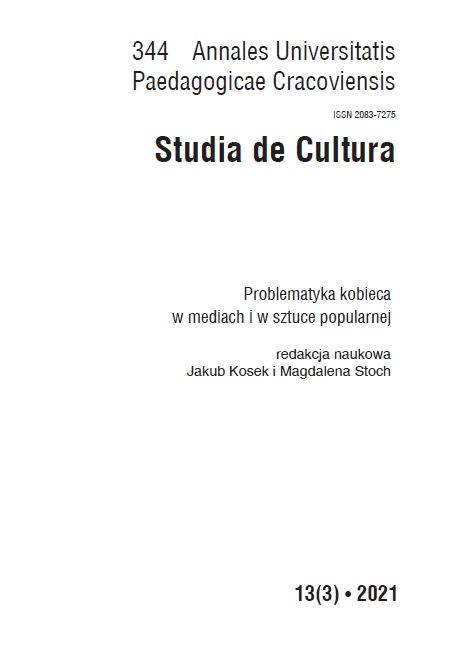Abstract
This article is an attempt to show the fundamental role of social media in promoting the body positive movement on the example of one of the most popular portals - Instagram. The purpose of the considerations is to present how Instagram contributes to the acceptance of one’s own body by its users and how this movement is presented in social and commercial advertising on this medium. The qualitative analysis was carried out on selected social campaigns and commercial campaigns of well-known fashion and cosmetics brands, which sparked a lively discussion among the public. These considerations may contribute to further media studies in this direction, especially on the body neutrality movement, which is a response to the body positive movement.
References
Bogunia-Borowska Małgorzata. 2004. Reklama jako tworzenie rzeczywistości społecznej. Kraków.
View in Google Scholar
Cwynar-Horta Jessica. 2016a. „The Commodification of the Body Positive Movement on Instagram”. Stream: Culture/Politics/Technology t. 8. 36–56. https://journals.sfu.ca/stream/index.php/stream/article/view/203. (dostęp: 14.08.2020).
View in Google Scholar
Cwynar-Horta Jessica. 2016b. Documenting Femininity. Body Positive and Female Empowerment on Instagram. Toronto. https://yorkspace.library.yorku.ca/xmlui/bitstream/handle/10315/32785/Cwynar-Horta_Jessica_C_2016_MA.pdf?sequence=2&isAllowed=y. (dostęp: 13.08.2020).
View in Google Scholar
Dallesandro Alysse. 2016. 15 Influencers Define Body Positivity. https://www.bustle.com/articles/165804-15-definitions-of-body-positivity-straight-from-influencers-activists. (dostęp: 13.08.2020).
View in Google Scholar
Dragan Marta. 2019. Body positive, czyli dlaczego nie musisz kochać swojego ciała, aby dobrze się w nim czuć?. https://www.hellozdrowie.pl/body-positive-czyli-dlaczego-nie-musisz-kochac-swojego-ciala-aby-dobrze-sie-w-nim-czuc/. (dostęp: 27.07.2020).
View in Google Scholar
Filipiak Marian. 2003. Homo communicans: wprowadzenie do teorii masowego komunikowania. Lublin.
View in Google Scholar
Głębocka Alicja. 2010. Niezadowolenie z wyglądu a rozpaczliwa kontrola wagi. Kraków.
View in Google Scholar
Gołaszewska-Kaczan Urszula. 2009. Zaangażowanie społeczne przedsiębiorstwa. Białystok.
View in Google Scholar
Gołębiewska Maria. 2003. Demontaż atrakcji. Gdańsk.
View in Google Scholar
Herbuś Iwona. 2016. „Działania reklamowe – od komercji do kampanii społecznych”. Zeszyty Naukowe Politechniki Częstochowskiej. Zarządzanie nr 22. 93–100.
View in Google Scholar
Hosie Rachel. 2018. What Is Body Neutrality and Why Do Some People Prefer It to Body Positivity?. https://www.independent.co.uk/life-style/body-neutrality-definition-movement-positivity-image-difference-explained-a8494646.html. (dostęp: 27.07.2020).
View in Google Scholar
Hughes Emma. 2019. The Instagramization of the City. Understanding the Spatial Reflections of Digital Trends. https://www.4cities.eu/wp-content/uploads/2019/10/C10_MAthesis_4CITIES_HUGHES_EMMA.pdf. (dostęp: 27.07.2020).
View in Google Scholar
Kemp Nicole. 2019. Beautiful, Isn’t It: Mothercare’s Redefinition of Marketing to Mums. https://www.campaignlive.co.uk/article/beautiful-isnt-it-mothercares-redefinition-marketing-mums/1579930. (dostęp: 13.08.2020).
View in Google Scholar
Kemp Simon. 2020. Digital 2020: Poland. https://datareportal.com/reports/digital-2020-poland. (dostęp: 15.08.2020).
View in Google Scholar
Limański Andrzej, Drabik Ireneusz. 2007. Marketing w organizacjach non-profit. Warszawa.
View in Google Scholar
Ludwig Zuzanna. 2018. „Body Mirror” – polski projekt body positive ukazujący naturalne piękno kobiet. https://www.elle.pl/artykul/body-mirror-polski-projekt-body-positive-pokazujacy-piekno-naturalnych-kobiet. (dostęp: 13.08.2020).
View in Google Scholar
Maison Dominika, Wasilewski Piotr. 2002. Propaganda dobrych serc, czyli rzecz o reklamie społecznej. Kraków – Warszawa.
View in Google Scholar
Matchar Emily. 2017. How Instagram Is Changing the Way We Design Cultural Spaces. https://www.smithsonianmag.com/innovation/how-instagram-changing-way-we-design-cultural-spaces-180967071/. (dostęp: 10.08.2020).
View in Google Scholar
Noor Poppy. 2019. What Is Body Neutrality, the New Trend Loved by Beautiful Celebs?. https://www.theguardian.com/fashion/2019/oct/31/body-neutrality-taylor-swift-jameela-jamil-latest-trend. (dostęp: 27.07.2020).
View in Google Scholar
Prochenko Paweł. 2010. Kampania społeczna – definicja Fundacji Komunikacji Społecznej. http://www.kampaniespoleczne.pl/wiedza_definicje,2324,kampania_spoleczna_definicja_fundacji_komunikacji_spolecznej. (dostęp: 7.07.2020).
View in Google Scholar
Sobczak Connie, Scott Elizabeth. Our Story. https://thebodypositive.org/faq/. (dostęp: 13.07.2020).
View in Google Scholar
Sosnowska Danuta. 2005. „Doskonałość niedoskonała”. Znak nr 6. 31–40.
View in Google Scholar
Zakowicz Ilona. 2012. „Starzenie się w kulturze młodości. Wybrane strategie obrazowania późnej dorosłości w reklamie”. Ogrody Nauk i Sztuk nr 2. 381–388.
View in Google Scholar
Wykaz zamieszczonych materiałów
View in Google Scholar
Tab. 1. Użycie hashtagów związanych z ruchem body positive na Instagramie
View in Google Scholar
Il. 1. Profil instagramowy @behindthescars_, https://www.instagram.com/behindthescars_/ (dostęp: 10.12.2021)
View in Google Scholar
Il. 2. Kampania „Body Proud Mums”, https://www.campaignlive.co.uk/article/beautiful-isnt-it-mothercares-redefinition-marketing-mums/1579930 (dostęp: 10.12.2021)
View in Google Scholar
Il. 3. Profil instagramowy @body_mirror, https://www.instagram.com/body_mirror/ (dostęp: 10.12.2021)
View in Google Scholar
Il. 4. Kampania „Fake Off! I’m Perfect!”, https://www.instagram.com/p/BgR5wnFj0eT/ (dostęp: 10.12.2021)
View in Google Scholar
Il. 5. Arvida Byström w reklamie butów firmy Adidas, https://www.instagram.com/p/BZd1cbNggu7/ (dostęp: 10.12.2021)
View in Google Scholar
Il. 6. Reklama marki Louie, https://www.instagram.com/p/B7B_hFqFNIO/ (dostęp: 10.12.2021)
View in Google Scholar
Il. 7. Reklama szminek firmy Gucci, https://www.instagram.com/p/BxCj2q9gdA6/?utm_source=ig_embed (dostęp: 10.12.2021)
View in Google Scholar

This work is licensed under a Creative Commons Attribution-NonCommercial 4.0 International License.

